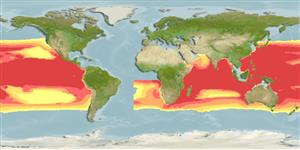Teleostei (teleosts) >
Myctophiformes (Lanternfishes) >
Myctophidae (Lanternfishes) > Myctophinae
Etymology: Symbolophorus: Greek, symbolon, ou = mark, signal + Greek, pherein = to carry (Ref. 45335).
Eponymy: Dr Barton Warren Evermann (1853–1932) was a schoolteacher (1876–1886) and a student at Indiana University, where he was awarded his bachelor’s degree (1886), master’s (1888) and doctorate (1891). [...] (Ref. 128868), visit book page.
More on author: Gilbert.
Environment: milieu / climate zone / depth range / distribution range
Ecology
Marine; bathypelagic; oceanodromous (Ref. 51243); depth range 100 - 500 m (Ref. 51600). Deep-water
Indo-Pacific: in tropical and subtropical waters to southern Hawaii near Marquesas. Eastern Pacific: coast of Peru approximately in front of Isla Huaura (Ref. 5530) and from Chile (Ref. 9068). South China Sea (Ref.74511).
Size / Weight / Age
Maturity: Lm ? range ? - ? cm
Max length : 11.7 cm TL male/unsexed; (Ref. 125989); max. published weight: 19.40 g (Ref. 125989)
High-oceanic and mesopelagic; nyctoepipelagic at the surface (Ref. 9192). Neustonic at 1-125 m at night, 600-1150 m during day (Ref. 58302). Feed at night in the western equatorial Pacific (Ref. 9192). Oviparous, with planktonic larvae (Ref. 31442). Lipid content is 3.1 % in fresh body weight and wax ester is10 % in total lipids (Ref. 9197).
Life cycle and mating behavior
Maturity | Reproduction | Spawning | Eggs | Fecundity | Larvae
Hulley, P.A., 1986. Myctophidae. p. 282-321. In M.M. Smith and P.C. Heemstra (eds.) Smiths' sea fishes. Springer-Verlag, Berlin. (Ref. 4066)
IUCN Red List Status (Ref. 130435: Version 2024-1)
Threat to humans
Harmless
Human uses
Tools
Can't connect to MySQL database fbquizv2. Errorcode: Too many connections
